Study reveals 2018 was most active year for class action filings in food, beverage industry
Continued success for the “reasonable consumer” defense, courts’ acceptance of formerly rejected damages models and increased attention toward multifunction ingredients and other ingredient labeling are just some of the factors the report examines.
Read More






